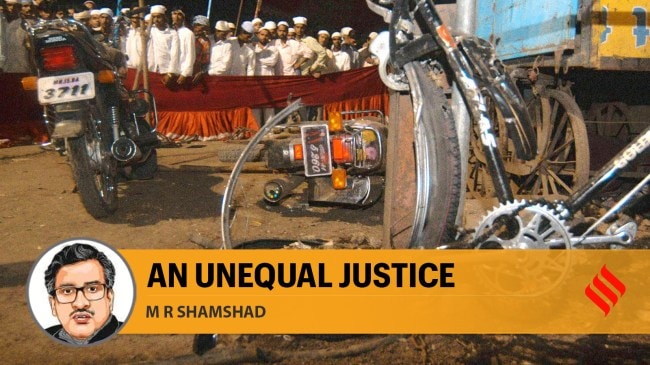Opinion Dear Editor I Disagree: Malegaon bombing, Mumbai train blast probes were very different failures by the state
Blatant disparities raise serious questions about the fairness, consistency, and accountability of our criminal justice system; questions that the system must answer.
 The site of the blast in Malegaon. (Express Archives: Prashant Nadkar)
The site of the blast in Malegaon. (Express Archives: Prashant Nadkar) The editorial ‘Malegaon questions’ (IE, August 4) correctly points out that the acquittals in the Malegaon case and the Mumbai train blasts case “just 10 days apart” raise “serious and urgent questions about the perils of the due process of justice”. However, the two cases proceeded in very different ways and present shocking contrasts — including in the political response to the verdicts — in the lapses they underline.
A bomb blast took place in Malegaon, Maharashtra, on September 29, 2008, killing six people and injuring 101. The prosecution examined more than 300 witnesses. Over time, several accused were discharged from various charges, and some of those discharge orders were later set aside by the High Court. Despite the involvement of three premier investigating agencies, the Local Crime Branch (Malegaon, Nashik), the Anti-Terrorism Squad (ATS), and the National Investigation Agency (NIA); the trial concluded after 17 years. Ultimately, all the accused were acquitted.
The trial’s outcome underlined a glaring failure of our criminal justice system. Despite exhaustive efforts, the agencies could only establish a suspicion of involvement, not evidence strong enough to secure a conviction. The court categorically held that the prosecution must prove guilt “beyond reasonable doubt” and that “no reliable, cogent, and acceptable evidence” existed to warrant a conviction. Furthermore, it reminded us that courts are not meant to “proceed on popular or predominant public perceptions”.
Even more shocking is the prosecution’s failure to validate the administrative sanctions required to prosecute the accused under the Unlawful Activities (Prevention) Act (UAPA); sanctions issued by top-level bureaucrats. The court attributed this to selective evidence collection and procedural lapses. It remarked that the investigation showed signs of “unwarranted procedure in collection of samples” and a “failure to perform their own duty.”
Contrast this with the July 11, 2006 Mumbai train blasts, in which seven coordinated explosions killed 187 people and injured over 800. The ATS arrested and charge-sheeted 13 accused. The trial concluded in six years, with all 13 being convicted. However, on appeal, the Bombay High Court found that there was no legally tenable evidence to sustain the convictions. All 13 were acquitted.
In both cases, the investigating and prosecuting agencies stand exposed. The heads of these agencies should hang their heads in shame. They have betrayed the trust of victims, their families, and the public at large. These failures are not just administrative lapses; they are systemic breaches of a constitutional duty.
In our system, criminal prosecutions too often serve as tools for propaganda rather than delivering justice. From the day of the incident through the trial, media coverage tends to focus on narratives based on the identity of the suspects or the political sensitivity of the matter, rather than objectively examining the facts. This creates a “feel-good” atmosphere for investigators and prosecutors, encouraging complacency and negligence.
What investigators must understand is this: Guilt must be proved with solid, admissible evidence. Courts are not meant to be sympathetic to investigative lapses. They are bound by constitutional mandates and legal precedents set by the Supreme Court of India. Courts cannot and must not lower evidentiary standards to accommodate poorly built cases.
Now, consider the responses of the Maharashtra government and political leadership to these two verdicts. In the Mumbai train blast case, when the Bombay High Court pronounced its acquittal on July 21, 2025, the state government filed an appeal in the Supreme Court on the same day. A stay on the acquittal was granted on July 24, 2025.
In sharp contrast, when the Malegaon blast verdict was delivered on July 31, acquitting all accused, the Chief Minister of Maharashtra immediately issued a public statement exonerating them. He claimed that the previous government had falsely implicated the accused due to their affiliation with a “saffron group”, conveniently forgetting the facts of the Mumbai train blast case. Instead of committing to finding the real perpetrators or announcing that the verdict would be appealed, as was done in the Mumbai case, the government gave a clean chit to the accused within hours.
Most of the accused in the Malegaon case were granted bail during the prolonged trial, after spending seven to nine years in custody. Once released, one went on to contest elections and served as a Member of Parliament, while another re-joined the Indian Army. Others resumed their lives outside prison. In stark contrast, the accused in the Mumbai train blast case remained incarcerated from 2006 until their acquittal in 2025; nearly two decades behind bars.
These blatant disparities raise serious questions about the fairness, consistency, and accountability of our criminal justice system; questions that the system must answer.
Justice cannot be selective. The detention of accused persons cannot continue without accountability. Justice cannot depend on who the victim is or what religious or political group the accused belongs to. Until our investigative agencies are made accountable, we will continue to see such tragic failures, and victims will continue to be denied justice.
The writer is senior advocate, Supreme Court of India






